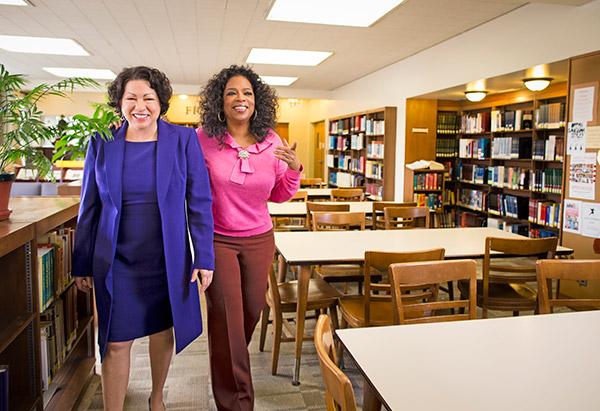Oprah Talks to Sonia Sotomayor

Photo: Rob Howard
Our nation's first Latina Supreme Court justice knows a thing or two about triumphing over adversity. As she prepares to publish a memoir, My Beloved World, Sonia Sotomayor chats candidly with Oprah about her humble beginnings in the Bronx, her life-changing call from President Obama, and the perils of dating when you sit on the highest court in the land.
The first thing that strikes me about Justice Sonia Sotomayor is her warmth. The second—her shoes. I've never pictured a member of our nation's highest court wearing leopard-print pumps, but that's what she has on when I meet her outside her old high school, Cardinal Spellman, in the Bronx (she graduated in 1972). As we walk the halls together, I learn that I have more in common with this Supreme Court justice than I would have thought possible. Besides being practically the same age, we've both loved books since childhood. Like me, she had a thing for the Encyclopedia Britannica, and like me, she now reads most everything on her iPad. We both joined the forensics team in high school, where we learned "how to speak and be persuasive," as she puts it. We both value our friendships: I've got Gayle along with me today, while the justice has brought Miriam Gonzerelli, her cousin and lifelong close friend, whom I read all about in the justice's new book, My Beloved World (she writes that Miriam was always the stylish one, while she herself dressed badly because "I'm competitive enough that I'll eventually withdraw from any consistently losing battle." It took her years to realize that being a smart lawyer didn't preclude her from also enjoying her "feminine side").
As the justice shares her memories of bounding up and down the stairs of Cardinal Spellman "a million times a day," I learn that there's one thing she and I don't share: I was never sent to the principal's office, while the justice evidently spent a lot of time there. She writes in My Beloved World that her family nickname was Ají, or "hot pepper." (And she has a sign in her office that reads "Well-Behaved Women Never Make History.") Certainly, as rambunctious as she was, the young Puerto Rican daughter of a nurse and a factory worker never imagined she'd someday return to find her face on a banner in her school's entryway.
I have no idea how a woman who spends her days weighing in on the greatest legal issues of our time managed to write a book, but I'm sure glad she did. My Beloved World is a moving homage to the justice's tight-knit family and their life in New York City in the '60s and '70s. I wanted to hear all about her amazing journey from the projects to Princeton to the height of the legal profession, which is why I've met her here in the Bronx, where it all started. "It was here at this school," she tells me, "that I began to see a larger world." And it's in the library, surrounded by many of the very same books she devoured as a teenager, that we begin.
Next: Read the full interview



